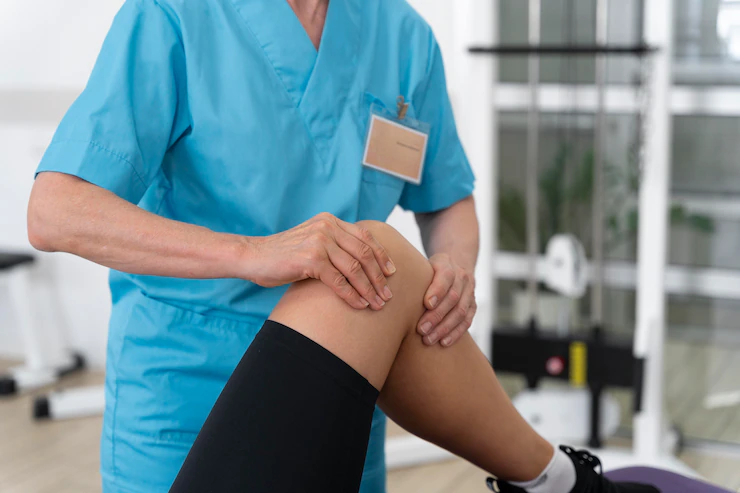Most of us have suffered from a painful joint, muscle strain, or broken bone at one point in our lives. Thankfully, orthopaedic doctors are here to help people heal and lead healthier and happier lives. Their specialisation in the musculoskeletal system can help diagnose and treat many physical ailments. In the section below, we will discuss the 10 most common ailments they can help to cure. Keep reading to find out more.
Who is an Orthopaedic Doctor?
An orthopaedic doctor is a physician who specialises in the musculoskeletal system. They deal with injuries and diseases related to bones, joints, ligaments, muscles, tendons and other body connective tissues. Orthopaedic doctors diagnose the conditions and provide medical management or surgery treatments. You can always consider Max Healthcare for the finest care.
Ailments An Orthopaedic Doctor Can Help To Cure
Mentioned below are the major ailments an orthopaedic doctor can help to cure:
1. Sports Injuries – Orthopaedic doctors are equipped to diagnose and treat sports-related injuries, from torn ACLs to tennis elbows. They are well-informed about preventive strategies that can help reduce the risk of injury in athletes.
2. Osteoarthritis – This degenerative joint disorder is caused by wear and tear, resulting in pain and stiffness in the joints. Orthopaedic doctors use medications, physical therapy, injectable treatments or surgery to alleviate the symptoms of osteoarthritis. The doctor can also suggest lifestyle modifications and exercises to reduce joint pain.
3. Spinal Disorders- Spinal disorders include herniated discs, sciatica, and scoliosis. Orthopaedic doctors can use treatments such as physical therapy, medications and surgery to treat these spinal disorders.
4. Fractures – These broken bones must be repaired appropriately for the patient to regain full function. Orthopaedic doctors provide the best treatment depending on the type and severity of the fracture. Worst fractures may require surgical procedures such as bone grafts, metal plates or wires to hold the bones together.
5. Rheumatoid Arthritis – This is a chronic autoimmune disorder causing pain and swelling in joints along with fatigue and fever. An orthopaedic doctor can diagnose this condition and recommend medications or other treatments to reduce symptoms. The doctor may also suggest lifestyle modifications like avoiding certain foods and exercising regularly to manage the condition.
6. Ligament Injury – Ligaments are bands of tissue connecting one bone to another, which can be torn due to injury or overuse. An orthopaedic doctor can use various treatments such as physical therapy, injections or surgery to treat ligament injuries. Surgery is typically only used when the injury is severe and other treatments cannot provide enough relief.
7. Sprains – These are injuries to the ligaments resulting from sudden twisting or stretching of joints. An orthopaedic doctor can help reduce swelling and pain and restore full function with the appropriate treatment plan. Seeing an orthopaedic doctor for proper diagnosis and treatment if you have a sprain is important.
8. Tendinitis – This is an inflammation of the tendon due to overuse or injury, which causes pain in the affected area. Orthopaedic doctors may prescribe medications and physical therapy to alleviate the symptoms of tendinitis.
9. Hip Replacement Surgery- Hip replacement surgery effectively alleviates pain and improves mobility in those suffering from a severe hip damage. Orthopaedic doctors will assess the patient’s condition, discuss all treatment options available, and recommend the best approach for optimal results. The surgeon may remove damaged portions of the femur, pelvis or other bones before inserting a prosthetic device. It can help restore motion and function to the hip joint. After recovery, patients typically experience improved quality of life with less pain and discomfort.
10. Anterior Cruciate Ligament (ACL) Injury- ACL injuries commonly occur when playing sports and cause knee pain, swelling and instability. An orthopaedic doctor can help diagnose the injury and provide treatment plans that may involve physical therapy or surgery. They will also be able to advise on exercises and lifestyle changes that can help with rehabilitation. Additionally, they may recommend using a brace or orthotics to aid recovery.
The Bottom Line
These are just some of the many ailments orthopaedic doctors can address. If you are facing any issue related to bones, joints, muscles or ligaments, consult an orthopaedic doctor as soon as possible for proper diagnosis and treatment. At Max HealthCare hospital, they ensure comprehensive medical services and treatments. With state-of-the-art infrastructure and experienced orthopaedic doctors, they help you get back on your feet as soon as possible.
Read more health blogs about squint eye.

